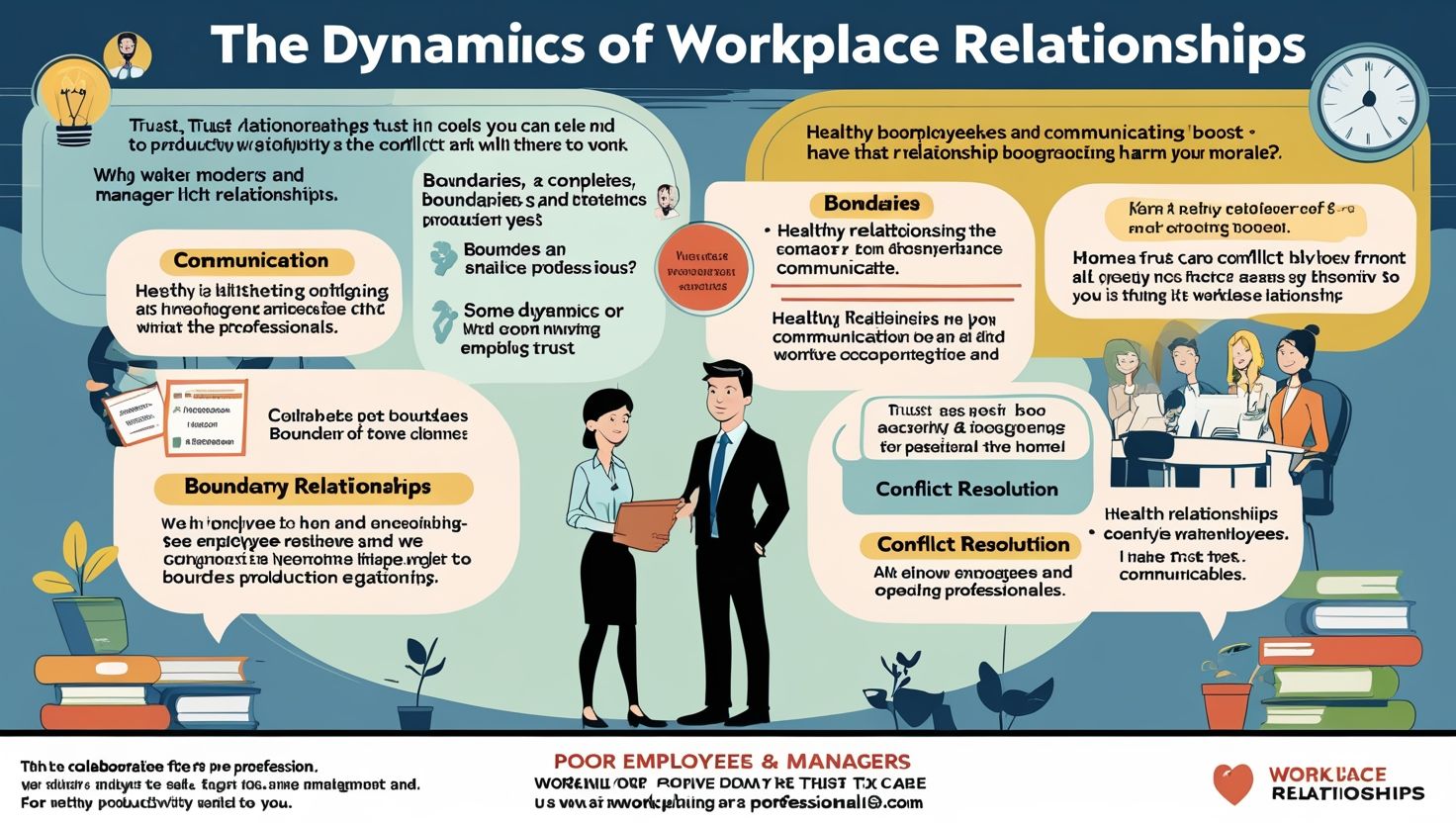Introduction to Workplace Relationships
The Dynamics of Workplace Relationships, Workplace relationships are the interpersonal connections that form between colleagues, managers, and subordinates within an organization. These relationships play a crucial role in shaping the work environment, influencing job satisfaction, productivity, and overall organizational success. Positive workplace relationships foster collaboration, trust, and open communication, while negative ones can lead to conflicts, reduced morale, and decreased efficiency. Understanding the different types of workplace relationships—such as professional partnerships, friendships, and mentor-mentee dynamics—helps employees navigate them effectively. A healthy workplace culture encourages mutual respect, teamwork, and emotional intelligence, ensuring that relationships remain constructive rather than disruptive. Organizations that prioritize strong interpersonal connections often experience higher employee retention, engagement, and innovation. However, maintaining professionalism is essential to prevent misunderstandings, favoritism, or breaches of workplace ethics. By recognizing the importance of workplace relationships, employees and employers alike can create a more harmonious and productive work environment.
Types of Workplace Relationships
Workplace relationships can be categorized into several types, each serving a distinct purpose. Professional relationships between colleagues focus on task-oriented collaboration, where mutual respect and clear communication are key. Manager-employee relationships revolve around guidance, feedback, and performance evaluation, requiring a balance of authority and approachability. Workplace friendships, while beneficial for morale, must be managed carefully to avoid perceptions of bias or unprofessional behavior. Mentor-mentee relationships provide career development opportunities, with experienced employees guiding less experienced ones. Cross-departmental relationships enhance inter-team coordination, breaking down silos within an organization. Additionally, romantic relationships in the workplace, though common, can introduce complications if not handled transparently and ethically. Recognizing these different relationship types helps employees set appropriate boundaries and expectations. Organizations can support healthy workplace relationships by promoting team-building activities, conflict resolution training, and clear policies on professional conduct. By understanding and respecting these dynamics, employees can cultivate meaningful connections that enhance both personal growth and organizational success.
The Benefits of Positive Workplace Relationships
Positive workplace relationships contribute significantly to employee well-being and organizational performance. Strong professional connections foster teamwork, leading to more efficient problem-solving and innovation. Employees who feel valued and supported by their peers and supervisors are more engaged, motivated, and loyal to the company. Trust-based relationships reduce workplace stress, as employees feel comfortable seeking help and sharing ideas. Collaboration improves when colleagues communicate openly, leading to higher-quality outputs and creative solutions. Mentorship relationships provide career advancement opportunities, helping employees develop new skills and gain industry insights. Workplace friendships can enhance job satisfaction, making the work environment more enjoyable and reducing turnover rates. Additionally, positive relationships between managers and employees lead to better performance reviews, as constructive feedback is given and received more effectively. Organizations with strong interpersonal connections often have a more inclusive culture, where diversity is respected, and conflicts are resolved amicably. Investing in relationship-building initiatives—such as team retreats, recognition programs, and open-door policies—can strengthen these bonds. Ultimately, fostering positive workplace relationships leads to a more cohesive, productive, and resilient workforce.
Challenges in Workplace Relationships
Despite their benefits, workplace relationships can also present challenges that hinder productivity and morale. Conflicts may arise due to miscommunication, competition, or differing work styles, leading to tension among team members. Power imbalances in manager-employee relationships can create discomfort, especially if favoritism or unfair treatment is perceived. Workplace friendships, if too exclusive, may lead to cliques that alienate other employees. Romantic relationships at work can result in distractions, conflicts of interest, or accusations of bias if not managed appropriately. Gossip and office politics can damage trust and create a toxic work environment. Additionally, remote work setups may strain relationships due to limited face-to-face interaction, making collaboration more difficult. Addressing these challenges requires proactive measures such as conflict resolution training, clear workplace policies, and promoting a culture of transparency. Employees should practice active listening, empathy, and professionalism to navigate interpersonal issues effectively. Managers play a crucial role in mediating disputes and ensuring fairness. By acknowledging and addressing these challenges, organizations can maintain healthy workplace dynamics that support both individual and collective success.
Maintaining Professionalism in Workplace Relationships
While workplace relationships can be beneficial, maintaining professionalism is essential to prevent complications. Employees should establish clear boundaries, ensuring that personal connections do not interfere with work responsibilities. Avoiding gossip and office politics helps maintain a respectful environment. In manager-employee relationships, fairness and objectivity should be prioritized to prevent favoritism. Romantic relationships at work should be disclosed to HR if company policies require it, ensuring transparency and minimizing conflicts of interest. Professional communication—whether in person, via email, or on messaging platforms—should remain courteous and appropriate. Emotional intelligence plays a key role in navigating workplace dynamics, allowing employees to manage conflicts diplomatically. Organizations can support professionalism by providing training on workplace ethics, anti-harassment policies, and effective communication. Encouraging a culture of mutual respect and inclusivity helps employees feel valued while maintaining productivity. By balancing friendliness with professionalism, employees can build strong workplace relationships without compromising their careers or the organization’s integrity.
Conclusion: Fostering Healthy Workplace Relationships
Workplace relationships are a fundamental aspect of professional life, influencing job satisfaction, collaboration, and organizational success. Positive relationships enhance teamwork, innovation, and employee retention, while negative ones can lead to conflicts and reduced productivity. Understanding different types of workplace connections—such as professional partnerships, mentorships, and friendships—helps employees navigate them effectively. Challenges such as miscommunication, favoritism, and office politics must be addressed through clear policies and conflict resolution strategies. Maintaining professionalism ensures that personal relationships do not disrupt work dynamics. Organizations that prioritize relationship-building through team activities, open communication, and ethical guidelines create a more supportive and efficient workplace. By fostering healthy workplace relationships, employees and employers alike can cultivate a thriving, respectful, and productive work environment.

Wow! This can be one particular of the most helpful blogs We’ve ever arrive across on this subject. Actually Magnificent. I am also a specialist in this topic so I can understand your effort.
ข้อมูลที่น่าสนใจมาก, มันทำให้ฉันอยากศึกษาเพิ่มเติม.
My homepage … pgsoft pgslot โค้ดฟรี